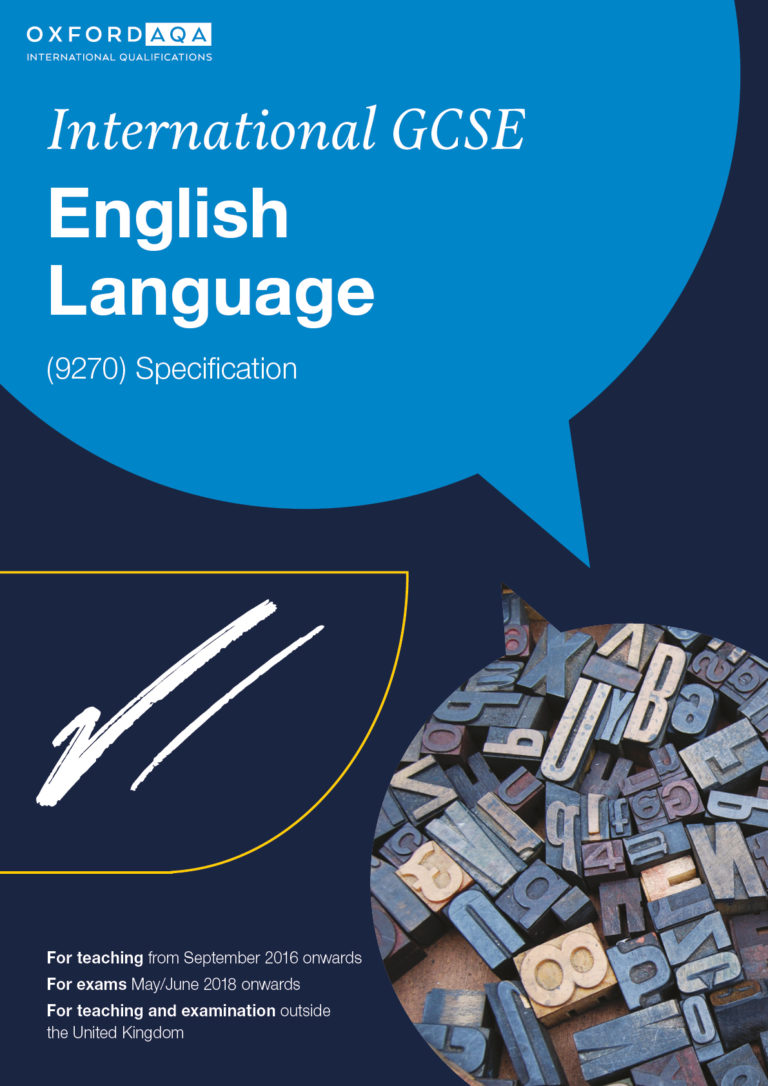
The International GCSE English Language specification that offers optimal flexibility to both teachers and learners.
Thanks to its rigorous summative assessment of students’ skills and abilities, this International English GCSE specification offers excellent preparation for International AS and A-level English Language, as well as giving students a grounding in a wide variety of language that will stay with them for life.
- The different reading tasks in Paper 1 and Paper 2 enable students to develop specific skills in inference, exploration, language analysis and deduction, alongside the more general skills of selection, synthesis and organisation.
- The distinctive ‘stepped’ approach to reading in Paper 1 helps all students to engage with the texts. Students have the opportunity to produce planned, developed and sustained responses, with a choice of writing tasks in both exam papers.
- The alternative non-exam assessment (NEA) option to Paper 2 will appeal to students of all abilities who wish to pursue an individual area of study. With its focus on independent research and learning and the development of study skills, it provides an invaluable preparation for higher level study.
International GCSE English Language (9270)
OxfordAQA International GCSE English Language covers the following topics:
Literary Non-Fiction and Composition:
- Section A (reading): literary non-fiction e.g. autobiography, biography, letters, memoir and travel/adventure writing.
- Section B (writing): three tasks from which students choose one: discursive, descriptive, imaginative/creative.
Source-Based Reading and Directed Writing:
- Section A (reading): modern world themes and issues.
- Section B (writing): writing for audience and purpose.
Non-Exam Assessment (NEA):
- Incorporates reading, study, research and writing skills.
Speaking and Listening (optional endorsement):
- This optional endorsement carries a separate statement on the student’s certificate for English to show proficiency in spoken English.
Assessment Objectives:
The exams will measure how students have achieved the following assessment objectives:
AO1: Reading
R1: Read and understand texts, selecting and utilising material appropriate to purpose.
R2: Collate and synthesise detail from one or more sources, making cross-references and comparisons as appropriate.
R3: Develop and sustain interpretations of writers’ ideas and perspectives.
R4: Explain and evaluate how writers use linguistic, grammatical, structural and presentational features to achieve effects and engage and influence the reader.
AO2: Writing
W1: Communicate clearly, effectively and imaginatively; use and adapt forms and select vocabulary
appropriate to task and purpose in ways that engage the reader.
W2: Use a range of sentence structures for clarity, purpose and effect.
W3: Organise information and ideas into sentences, paragraphs and whole texts; use a variety of linguistic and structural features to support cohesion and overall coherence.
W4: Demonstrate technical accuracy in grammar, punctuation and spelling.
AO3: Speaking and Listening (Optional Endorsement)
SL1: Communicate clearly and purposefully; structure and sustain talk, and use a variety of techniques as appropriate.
SL2: Prepare and develop ideas and concepts; listen and respond to questions about these.
SL3: Interact with others, shaping meanings through comments, responses to questions and drawing ideas together.
OxfordAQA provides all the resources and advice you need to teach the International GCSE English Language specification effectively.
- Download the specification
- View our training courses to help you deliver OxfordAQA International GCSE English Language
- Approved textbooks and resources published by Oxford University Press
We have too many resources to list here, so please visit our resources area for teachers to see them all, including:
- Schemes of work to allow you to plan how to deliver the specification in a way that will best suit you and your students
- Teaching guidance to outline clearly the scope of teaching and learning
- Topic tests and mock exam analysers to allow you to track your students’ progress throughout the teaching year.
This is a linear qualification with two routes through the GCSE.
Paper 1 – Literary Non-Fiction and Composition:
- Section A – Literary Non-Fiction
- Section B – Composition
- Students answer all questions from Section A and one question from Section B
- 2 hours
- 80 marks
- 60% of GCSE
Route A:
Paper 2 – Source-based Reading and Directed Writing:
- Section A – Reading
- Section B – Writing
- Students answer all questions from Section A and one question from Section B
- 2 hours
- 80 marks
- 40% of GCSE
Route B:
Non-Exam Assessment (NEA):
- Students complete a written task and commentary.
- Teacher assessed and AQA moderated.
- 60 marks
- 40% of GCSE
OPTIONAL ENDORSEMENT – Speaking and Listening:
- Students undertake either a presentation or an interview with extended turns speaking and responding.
- Teacher assessed and AQA moderated.
Re-sits
- Linear specification; individual components may not be re-sat.
- Candidates can re-take the whole qualification as many times as they wish.
Take a look at:
- Taster video
- Example specimen exam paper and mark scheme
You must be an approved OxfordAQA centre to enter students for our exams. Make sure you become an OxfordAQA centre before you start teaching a course.
